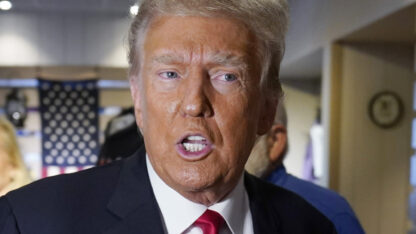As Donald Trump faces a 37-count federal indictment and the possibility of a lengthy prison sentence if convicted, House Republicans are using a special counsel’s report to renew their argument that federal law enforcement is tainted by political bias.
John Durham, who recently completed his report on the FBI’s investigation of Trump’s 2016 campaign, will testify Wednesday before the House Judiciary Committee. That’s one day after Durham met behind closed doors with members of the House Intelligence Committee.
While Durham produced just three prosecutions — with two acquittals — in a four-year investigation, his report highlighted FBI agents withholding key information from judges and contended the bureau disregarded reasons not to investigate Trump’s campaign.
Republicans who control the House say they’re still angry about the 2016 campaign probe, known as “Crossfire Hurricane,” and intend to push new curbs on the FBI in exchange for renewing surveillance powers known as Section 702 that U.S. intelligence considers critical and that expire at the end of this year. Many Democrats also want new rules on what access the FBI has to search foreign surveillance data for information about U.S. citizens and companies.
GOP animosity toward the Justice Department was further fueled by Tuesday’s announcement that President Joe Biden’s son Hunter will likely avoid jail time in a plea deal on tax and gun allegations. Republican Rep. Jim Jordan of Ohio, who chairs the Judiciary Committee, tweeted, in all caps, that it was a “double standard of justice.”
Jordan opened Wednesday’s hearing by trying to draw a line between the Russia investigation and Trump’s indictment over mishandling classified documents at his Mar-a-Lago estate, suggesting they were both fueled by a desire to get Trump.
“Nothing has changed and they’re never going to stop,” Jordan said. “Seven years of attacking Trump.”
Durham was appointed by former Attorney General William Barr to review the origins of the investigation into ties between Russia and Trump’s 2016 campaign.
He concluded that the FBI acted too hastily and without sufficient justification to launch a full investigation and asserted the bureau showed more caution on allegations that former Secretary of State Hillary Clinton mishandled classified information on her private email server.
He also said the FBI cited the so-called Steele dossier before the primary U.S. surveillance court even after investigators failed to corroborate “a single substantive allegation” within it. The Clinton campaign partially funded creation of the dossier and agreed last year with the Democratic National Committee to pay a $113,000 fine for misreporting campaign spending on research.
The Durham report yielded only one conviction — a guilty plea from a little-known FBI employee — and the only two other cases that were brought both ended in acquittals at trial.
And though Durham accused the FBI of confirmation bias, he did not allege that political bias or partisanship were guiding factors for the FBI’s actions.
The bureau also is facing bipartisan criticism of how it handles intelligence collected electronically under Section 702. Section 702 of the Foreign Intelligence Surveillance Act allows spy agencies to collect foreign phone calls and e-mails for their investigations.
A newly declassified surveillance court opinion found that the FBI had run thousands of unsupported searches of Americans, including queries tied to the Jan. 6 insurrection and the 2020 protests following the killing of George Floyd.
Previewing Durham’s meeting with the Intelligence Committee, Ohio Rep. Mike Turner, the panel’s chairman, alleged last week that the FBI “went off the rails” and hurt the justice system’s credibility.
“Rules and laws need to be changed so that these mechanisms cannot be used again in this way to really harm the American public,” he said.
Connecticut Rep. Jim Himes, the panel’s top Democrat, said after the committee’s meeting Tuesday that Durham did not recommend any changes to existing law but broadly discussed the issues in the report and the handling of politically sensitive investigations.
“Our hearing was not political. Nobody was looking to score points,” Himes said. “People asked questions that indicated their political affiliation, but that’s because they were doing due diligence around things that concern them.”
FBI Director Chris Wray has acknowledged errors in how the bureau handled the Trump-Russia probe. In a statement Tuesday, the bureau said it had “already implemented dozens of corrective actions, which have now been in place for some time.”
The Durham report “reinforces the importance of ensuring the FBI continues to do its work with the rigor, objectivity, and professionalism the American people deserve and rightly expect,” the statement said.
The House GOP push to highlight the Durham report comes as Trump — the frontrunner in the 2024 GOP primary — fights legal jeopardy never faced before by a former president.
Trump is under federal indictment accusing him of mishandling classified documents and indicted in New York over allegations that he knew about hush money payments made to a porn actress during his 2016 campaign.
Most Republicans have denigrated the New York indictment as tainted by politics, but they have split on the Justice Department case brought by special counsel Jack Smith.
Turner was asked last week if he was alarmed by the federal indictment.
He responded, “The behavior that is described within the complaint, and the behavior that we’re aware of that President Biden as a senator or vice president did, are wrong and place the nation at risk.”









